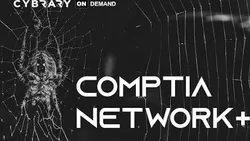
CompTIA Network+ Course Certification 
Learn the basics of CompTIA Network+ Course Certification ▼
ADVERTISEMENT
Course Feature
![]() Cost:
Cost:
Free
![]() Provider:
Provider:
Cybrary
![]() Certificate:
Certificate:
Paid Certification
![]() Language:
Language:
English
![]() Start Date:
Start Date:
On-Demand
Course Overview
❗The content presented here is sourced directly from Cybrary platform. For comprehensive course details, including enrollment information, simply click on the 'Go to class' link on our website.
Updated in [May 19th, 2023]
This CompTIA Network+ Certification Course provides an overview of the OSI Model and TCP/IP Model. It also covers the physical layers, data link layer, and lessons 5 and 6 of 10. The course is designed to help students gain a comprehensive understanding of the fundamentals of networking and prepare them for the CompTIA Network+ certification exam. It is divided into 10 lessons, each focusing on a different aspect of networking. The course covers topics such as network topologies, protocols, and security. It also provides hands-on activities to help students gain practical experience. Upon completion of the course, students will have a thorough understanding of the fundamentals of networking and be well-prepared to take the CompTIA Network+ certification exam.
[Applications]
The application of the CompTIA Network+ Course Certification can be seen in the ability to understand the OSI Model and TCP/IP Model, as well as the physical and data link layers. Additionally, the course provides a comprehensive overview of the different types of networking protocols and their applications. With this knowledge, individuals can better understand how networks are structured and how to troubleshoot and configure them. Furthermore, the course can be used to prepare for the CompTIA Network+ certification exam. After completing the course, individuals should be able to demonstrate their knowledge of networking concepts and technologies, as well as their ability to configure, manage, and troubleshoot networks.
[Career Paths]
1. Network Administrator: Network Administrators are responsible for the installation, maintenance, and troubleshooting of computer networks. They are also responsible for ensuring the security of the network and its data. With the increasing demand for more secure networks, the demand for Network Administrators is expected to grow.
2. Network Engineer: Network Engineers are responsible for designing, implementing, and managing computer networks. They must have a strong understanding of network protocols, hardware, and software. As the demand for more secure networks increases, the demand for Network Engineers is expected to grow.
3. Network Security Analyst: Network Security Analysts are responsible for identifying and mitigating security threats to computer networks. They must have a strong understanding of network security protocols and technologies. With the increasing demand for more secure networks, the demand for Network Security Analysts is expected to grow.
4. Network Architect: Network Architects are responsible for designing and implementing computer networks. They must have a strong understanding of network protocols, hardware, and software. As the demand for more secure networks increases, the demand for Network Architects is expected to grow.
[Education Paths]
1. Bachelor's Degree in Computer Science: A Bachelor's Degree in Computer Science is a great way to gain a comprehensive understanding of computer networks and the technologies used to build them. This degree program typically covers topics such as computer architecture, operating systems, networking protocols, and network security. Additionally, students will learn about the fundamentals of computer programming and software development. With the increasing demand for skilled network engineers, a Bachelor's Degree in Computer Science is a great way to get ahead in the field.
2. Master's Degree in Network Engineering: A Master's Degree in Network Engineering is a great way to gain a more in-depth understanding of network technologies and their applications. This degree program typically covers topics such as network design, network security, network protocols, and network management. Additionally, students will learn about the latest technologies and trends in the field. With the increasing demand for skilled network engineers, a Master's Degree in Network Engineering is a great way to get ahead in the field.
3. Master's Degree in Information Technology: A Master's Degree in Information Technology is a great way to gain a comprehensive understanding of the technologies used to build and maintain computer networks. This degree program typically covers topics such as computer architecture, operating systems, networking protocols, and network security. Additionally, students will learn about the fundamentals of computer programming and software development. With the increasing demand for skilled IT professionals, a Master's Degree in Information Technology is a great way to get ahead in the field.
4. Doctorate Degree in Computer Science: A Doctorate Degree in Computer Science is a great way to gain a comprehensive understanding of computer networks and the technologies used to build them. This degree program typically covers topics such as computer architecture, operating systems, networking protocols, and network security. Additionally, students will learn about the fundamentals of computer programming and software development. With the increasing demand for skilled network engineers, a Doctorate Degree in Computer Science is a great way to get ahead in the field.
Course Provider

Provider Cybrary's Stats at AZClass
Discussion and Reviews
0.0 (Based on 0 reviews)
Explore Similar Online Courses

Multivariable calculus

COVID-19 vaccine-specific resources

Python for Informatics: Exploring Information

Social Network Analysis

Introduction to Systematic Review and Meta-Analysis

The Analytics Edge

DCO042 - Python For Informatics

Causal Diagrams: Draw Your Assumptions Before Your Conclusions

Whole genome sequencing of bacterial genomes - tools and applications

Google Certification Training IT Support 2022 Full Course

Make $100k+ working from home with FREE Google Certification trainings

make CRAZY money in tech (top 5 Entry-Level Certs)
 Related Categories
Related Categories
 Popular Providers
Popular Providers
Quiz
 Submitted Sucessfully
Submitted Sucessfully
1. What is the OSI Model?
2. What is the purpose of the Physical Layer?
3. What is the purpose of the Data Link Layer?
4. The _______ Layer is responsible for providing the physical connection between devices.
Correct Answer: Physical


Start your review of CompTIA Network+ Course Certification